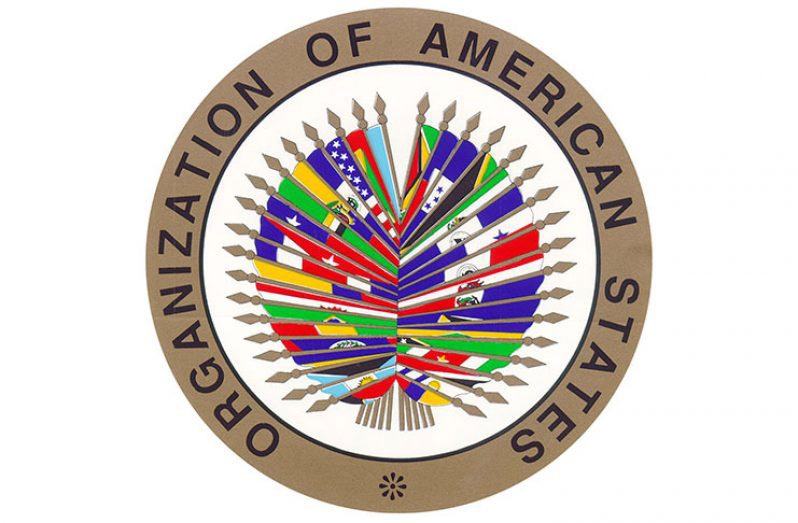–says Bolivarian Republic endangering regional peace, security
THE Organization of American States (OAS) has squarely denounced the Venezuelan regime’s recent approval of the so-called “Law for the defence of Essequibo,” labelling it as a threat to regional peace and security.
The strong statement issued by the General Secretariat of the OAS on Monday did not mince words, asserting that the Venezuelan law, purportedly aimed at territorial defence, starkly contradicts fundamental principles of international law and underscores the dictatorial tendencies of the regime.
The OAS described it as reminiscent of sad historical episodes that led to annexations by force, military aggression, and destruction.
“The Venezuelan regime, which a few days ago approved a fascist “law” to combat “fascism, neo-fascism and similar expressions,” also approved a so-called “Law for the defense of Essequibo” whose “legislative” standards recall sad historical episodes that led to annexations by force, military aggression and destruction.
“Regional peace and security depend on stopping the Venezuelan regime from advancing these threatening objectives. International law condemns the crime of aggression, condemns the threat of aggression, condemns unilateral actions to resolve bilateral problems, condemns non-compliance and violation of current Arbitration Awards and, as an international community, we must condemn bellicose attitudes and intimidation of countries and international actors,” the OAS said.
According to the OAS, the approval of this law by the Venezuelan regime signifies a dangerous escalation of aggressive posturing, with the potential to destabilise the entire region.
Alluding to the gravity of the situation, the statement highlighted the regime’s pattern of bellicose behaviour, including recent legislative manoeuvres aimed at combating dissent under the guise of combating fascism.
In a clear rebuke, the OAS underscored the imperative of halting the Venezuelan regime’s march towards what it termed as “threatening objectives.”
The OAS highlighted the condemnation of unilateral actions to resolve bilateral issues, citing Venezuela’s disregard for current Arbitration Awards and its unilateral measures aimed at annexing territory belonging to the Cooperative Republic of Guyana.
The OAS expressed solidarity with Guyana, applauding its decision to seek recourse through the International Court of Justice (ICJ) and condemning the Venezuelan regime’s attempts to intimidate other international actors.
Additionally, the statement highlighted the detrimental impact of Venezuela’s actions on the legacy of peaceful relations with Caribbean nations and the exploitation of Guyana’s natural resources.
Characterizing the “Law for the defense of Essequibo” as a tool for both external aggression and internal repression, the OAS warned of its potential to plunge the region into further insecurity. It stressed that the law not only jeopardizes the security of Guyana but also threatens the peace and stability of the entire hemisphere.
In light of these developments, the OAS called upon the international community to condemn Venezuela’s belligerent actions and stand in solidarity with those affected by its aggressive posturing. The organisation encouraged concerted efforts to address the escalating crisis and safeguard the principles of international law and regional stability.
“The combined use of internal repression with the regime’s aggressive stance towards the Cooperative Republic of Guyana is a new milestone in the Venezuelan regime’s infinite spiral of moral and political poverty. This law puts at risk the security not only of Guyana, but also the peace and security of the hemisphere,” OAS said.
Commonwealth Secretary-General, Patricia Scotland, KC, recently echoed the concern of President Dr Irfaan Ali that its neighbour will move to seize Guyana’s territory.
The Commonwealth Secretary-General called on fellow Commonwealth member states to lend Guyana support in this time of need. By this new law, Venezuela is attempting to control over two-thirds of the sovereign territory of Guyana.
The Commonwealth Secretary-General urged the Government and people of the Bolivarian Republic of Venezuela to abide by the principles of international law and to manage the issue in ways that guarantee the peace and stability of the Caribbean region.
The border between Guyana and Venezuela was settled by an arbitral tribunal on October 3, 1899, but on the event of Guyana’s independence in 1966, Venezuela repudiated the award which it had upheld for more than 60 years.
Decades of talks failed to settle the controversy and the United Nations Secretary-General, in keeping with an agreement in Geneva which Venezuela signed on to, referred the matter to the International Court of Justice.
In provisional measures granted last December, the Court ruled that Guyana has governed and exercised sovereignty over the 83,000 square miles determined as its territory in 1899, and that should not change unless the court determines otherwise in its ultimate ruling.
Back in December 2023, Presidents Ali and Maduro met in St. Vincent & the Grenadines. The meeting was facilitated by the Prime Minister of St. Vincent and the Grenadines, Ralph Gonsalves, and observed by Brazil, CARICOM, and a UN Under-Secretary-General.
That meeting culminated with the Argyle Declaration that outlines a pledge from both countries to refrain from escalating the decades-old border controversy between the two states.
The two leaders had also interacted at the recent VII summit of the Community of Latin American and Caribbean States (CELAC) in St. Vincent and the Grenadines, where they exchanged tokens. The substantive case is still before the ICJ.





.jpg)








